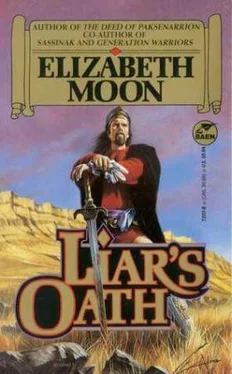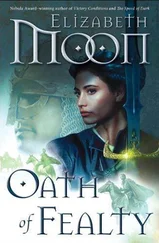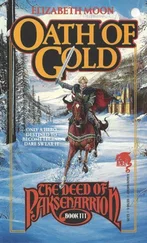“Do you know her name from before?”
The old lady’s eyes twinkled in mischief. “Of course I do, but if she hasn’t told even Gird, why should I tell you? I doubt she has much family left to be embarrassed, but it’s her business, silly as she is.” Luap could not imagine anyone thinking Autumn Rose silly. Dangerous and difficult, but not silly. “You might just tell her it sounds more like a title than a name.”
Luap grinned. It had not occurred to him that the old lady would have known the Autumn Rose, or, knowing her, might disapprove. She sounded as she might about an errant granddaughter. “I think of her as Rosemage,” he said. “Some call her that.”
Another sniff. “It would not hurt either of you to ask Esea’s guidance,” she said. “You’ve no time for foolishness, either of you, at your ages.” Then, with a last nod, she left, leaning only slightly on Eris’s arm. Luap followed silently to the outer door, then climbed the stairs to his office. He felt even more unsettled than usual. Everyone wanted something from him, but none of them agreed on what it was. All the decisions he’d made so firmly, in good faith, seemed to be coming apart, unravelling in his hands like rotting rope.
Through the hottest days of summer, Luap kept to his work. Gird wanted copies of the newest version of the Code spread widely by late harvest; he asked no more about Luap’s real father, only about how the copying proceeded. Aside from the heat, the work suited Luap well. He could concentrate his mind on accuracy, on the precise flavor of a phrase, on Gird’s intention and its best expression. He had little time for memory, though he found forgotten courtesies creeping into his speech. “It’s that old lady, eh?” asked Gird. Luap agreed it probably was, or perhaps Arranha. He tried not to think about it, and claimed his work prevented visiting Dorhaniya until he’d finished the Code. It was safer not to think of it, to submerge himself in Gird’s plans, to become, if he could, the eldest son or younger brother that Gird so desperately needed.
But at last the copying had been done, and in the cooler fall weather, he had more than an excuse to leave Fin Panir—he could best be spared to carry the copies to the larger granges, where more copies could be made to send elsewhere. So it was that on a dank autumn day he found himself peering along the bank of a stream for the overhanging rock and dark entrance to a certain cave.
He did not let himself wonder why he chose not to stay overnight at Soldin, knowing he could not reach Graymere by sundown. When the chill autumn drizzle thickened to gusts of rain, he made for the cave directly. It was the only thing to do. It was logical, reasonable, and he did not have to manufacture an excuse.
It bothered him slightly that he could think of making an excuse. He had legitimate business, Gird’s business, in Soldin and Graymere both. No one would have questioned his spending a night in the cave, even if anyone had seen him. The yeoman-marshal in Soldin had suggested that he stay the night there, but obviously saw nothing amiss in Gird’s luap choosing to press on, even in bad weather. Young and earnest, he expected such dedication in Gird’s personal staff.
Luap had wondered if other travelers used the cave . . . surely they did. But on this dank, dripping evening no smoke oozed from the entrance, and no tethered mounts or draft teams snorted or stamped as he legged his own mount along the creek bank. A pile of blackened rocks marked a firepit, obviously in recent use—but not today. He would have it to himself, unless someone showed up later. He hoped no one would, but he was grateful to the previous users, who had stacked dry wood inside the entrance, out of the rain.
He got his fire going, and went out to gather more wood to dry beside it. Someone had improved the path down to the creek, cutting steps and anchoring them with stone; the single plum he vaguely remembered had suckered into a thicket, now dropping their narrow leaves to the sodden ground. By the time he had found wood to replace what he expected to use, it was nearly dark.
His wet cloak steamed as he set his traveling kettle to boil. So did his horse’s coat, and the smell of horse expanded, he thought, to fill the cave as well as his head. Wet wool, wet horse . . . almost as bad as the stench of their army, the last time. And then someone else had done the cooking. His head felt heavy, stuffed with thick smells and memories . . . including that final memory, of Gird’s fist against his skull. He ran his hands over his wet hair as if feeling for that old lump. There—it had been there, and another bruise on the other side, where he’d fallen against stone.
He had eaten his soaked wheat and beans, and a lump of soggy bread that wrapping had not kept dry, had gone out into the fine rain to use the jacks he’d dug, and was back in the cave’s relative warmth and dryness, when he admitted to himself just why he had chosen that trail, that day, in that weather. Of course he didn’t expect anything to happen. He had had his revelation, first from the gods, and then from Gird: you are a king’s son, and (or but) you can’t be a king. One revelation to a lifetime, Gird had said after Greenfields, and would explain no more than that.
But for Luap it had happened here, and he still did not understand it. As with the rest of his life, he had been shown something, a small glimpse of some mystery, and then it vanished. He had learned to hoard such glimpses, to keep them hidden deep in his mind, until he found another—and another—and could try to make them fit some pattern. He had learned, he realized, in all the ways Gird despised . . . that he himself despised, when he thought how he admired Gird . . . but ways he could not change. Not now. Gird had all the pieces of his pattern—had always had them. He had always known who he was, and what his place was, growing out of his own ground like a young tree. Luap had had sidelong looks, sly taunts, occasional brief phrases, whispers, suggestions, riddles. “Don’t you know, boy?” he remembered an older youth had asked once. “Only bastards don’t know who their fathers are.” The boy had been yanked away by someone in guards’ uniform, and disappeared; Luap never saw him again.
He sat staring at the flames, ignoring the dancing shadows on the walls that shifted, bowed, straightened in answer to the flames’ movement. He had come back because . . . because he was going back in there, to the place where he got one straight answer, for once in his life, and might—no matter what Gird said—get another.
But that means, one of his inner voices said, that you are not content to be Gird’s luap. Was that true? Alone in the cave, in the orange firelight, he let himself think about that. Feel about that. He did not resent Gird. Gird had won his heart, that first night, when he had had to confess his duplicity, when Gird had let him sob out the agony of loss. Gird had defended him against the other peasant leaders. And even the blow that felled him had been, he realized, justified. In the years since, he had come to believe that Gird, with all his peasant coarseness, all his human failings, had the intrinsic greatness of an ancient tree, or a mountain.
Yet he did not want to be only a luap forever. He let himself remember, cautiously, his life before the war. His wife and children were long dead, their suffering ended. He would regret his treatment of them for the rest of his life . . . but that was in the past. Tonight . . . tonight, he would like to have had a woman beside him. A child leaning against his knee. A place where he, not Gird, was paramount. A kingdom, however small, in which to be king.
Here, inside a whole mountain, on a black night of dripping rain, no one would see him use his power; no one could see his light. It could not be betrayal if no one knew. He felt his way to it cautiously, even here—a little light, just enough to see by—and his hands enclosed it, glowing. He felt the hairs rise on his arms. He could still do it; it had not vanished. Despite Arranha’s assurance that it would not, he had doubted. Around him, in the throat of the cave, the walls showed their stripes of gray and pink and brown. There was the ledge over which Gird had stumbled . . . there, the opening beyond.
Читать дальше












